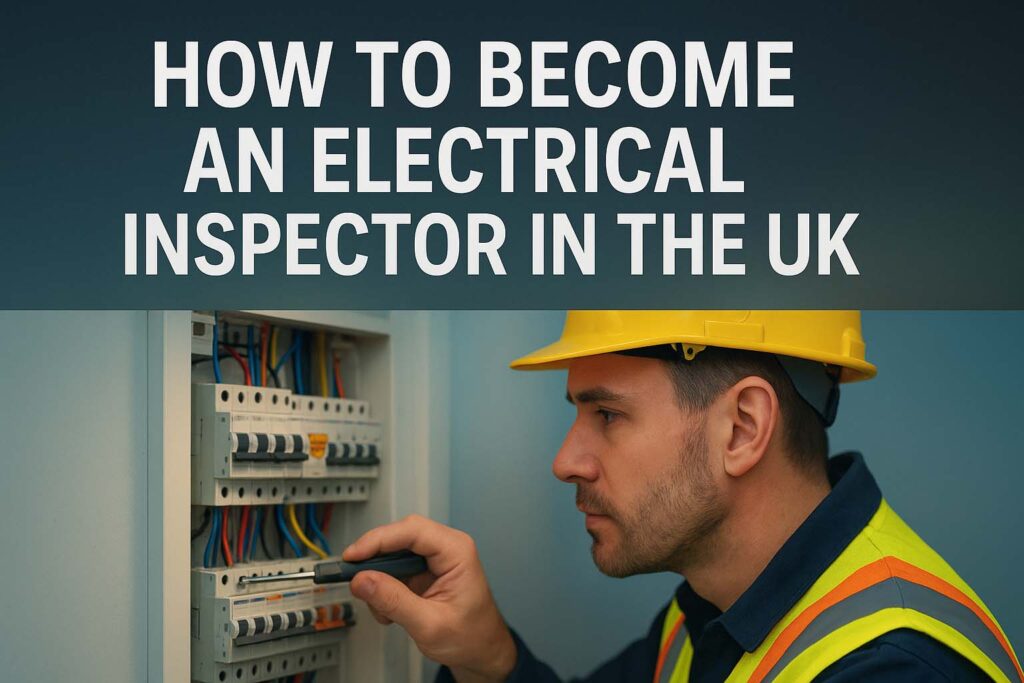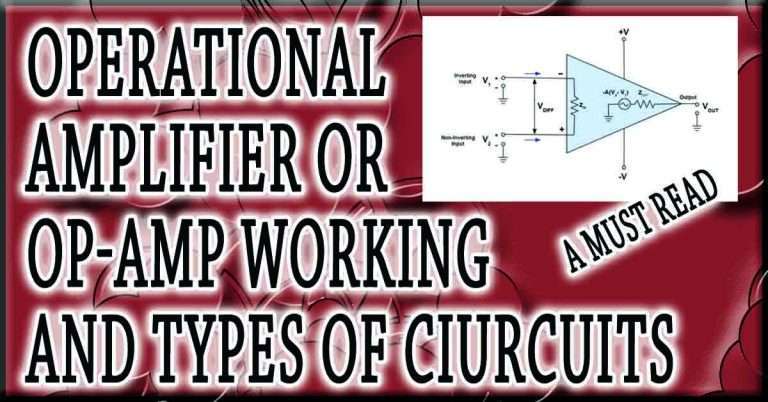How to Become an Electrical Inspector in the UK
Becoming an electrical inspector in the UK is a respected and rewarding career choice. It combines technical expertise, safety awareness, and compliance with national regulations. Electrical inspectors play a vital role in ensuring that electrical installations are safe, reliable, and aligned with the standards set by the Institution of Engineering and Technology (IET) and the British Standards. In today’s fast-growing construction and renewable energy sectors, the demand for skilled electrical inspectors has increased significantly.
Table of Contents
Table of Contents

If you are already an electrician or considering a technical path in the electrical industry, this career offers opportunities for growth and long-term stability. The path to becoming an electrical inspector requires a clear understanding of qualifications, training, regulatory compliance, and hands-on experience. The UK electrical system operates under strict codes, and only qualified professionals can be trusted to verify safety and compliance.
This guide will give you a complete roadmap on how to become an electrical inspector in the UK, covering the essential qualifications, training routes, skills, job outlook, and earning potential. It is written in a simple, clear style to make the information easy to understand, while also providing deep technical insights for aspiring professionals.
Key Takeaways
- Electrical inspectors ensure compliance with UK electrical safety standards and regulations.
- Becoming an inspector requires a solid electrical background, advanced qualifications, and regulatory training.
- The job offers competitive salaries, career growth, and opportunities in multiple sectors including housing, industry, and renewable energy.
Know more about Electrical Safety Officer Certification in USA: Cost, Duration & Job Scope
Understanding the Role: How to Become an Electrical Inspector in the UK
An electrical inspector in the UK is responsible for assessing electrical systems, installations, and maintenance work. The role goes beyond just checking wires and sockets. Inspectors evaluate the entire system for safety, reliability, and compliance with regulations such as the BS 7671 Wiring Regulations and the Electricity at Work Regulations 1989.
They are often employed by local authorities, construction firms, inspection bodies, and private organizations. Their daily tasks include inspecting new electrical installations, testing existing systems, writing compliance reports, and issuing safety certificates.
Understanding how to become an electrical inspector in the UK means recognising that this job is both technical and legal in nature. Inspectors must know electrical theory, testing procedures, and the UK’s regulatory framework. They also need excellent communication skills to explain technical findings to non-technical stakeholders.
Qualifications Required: How to Become an Electrical Inspector in the UK
To pursue this career, you must have the right mix of academic qualifications and practical experience. Most inspectors begin their journey as qualified electricians. The standard qualifications include:
Level 3 Diploma in Electrical Installations (2365 or equivalent) – This is the foundational qualification for electricians in the UK.
NVQ Level 3 in Electrotechnical Systems – Provides practical training and evidence of on-site skills.
City & Guilds 2391-52 Inspection and Testing – The most relevant qualification for becoming an inspector, covering both initial verification and periodic inspection and testing.
BS 7671 Wiring Regulations (18th Edition) – Essential for understanding UK standards for electrical installations.
Many employers also prefer candidates with higher-level qualifications such as HNC or HND in Electrical Engineering, especially for inspectors working in industrial or high-voltage environments.
Know more about Electrical Safety Officer Roles & Responsibilities
Table: Core Qualifications for Electrical Inspectors
| Qualification | Purpose | Requirement Level |
|---|---|---|
| Level 3 Diploma in Electrical Installations | Foundation knowledge in electrical systems | Essential |
| NVQ Level 3 Electrotechnical | On-site practical skills | Essential |
| City & Guilds 2391-52 | Inspection and Testing expertise | Mandatory |
| 18th Edition Wiring Regulations | Compliance with BS 7671 | Mandatory |
| HNC/HND Electrical Engineering | Advanced knowledge for industrial inspectors | Preferred |
Training and Experience: How to Become an Electrical Inspector in the UK
Having the qualifications is only the start. To truly understand how to become an electrical inspector in the UK, you need real-world experience. Most inspectors build a strong foundation as electricians for several years before moving into inspection roles. Practical experience is crucial because it helps you identify faults, interpret test results, and handle complex installations.
Apprenticeships are one of the most common entry routes. A four-year apprenticeship typically covers electrical theory, hands-on installation work, and compliance training. After completing an apprenticeship and obtaining qualifications, electricians often work in domestic, commercial, or industrial environments before specializing in inspection.
Continuous professional development (CPD) is also important. Inspectors must stay updated with regulation changes, such as amendments to BS 7671, new testing technologies, and safety innovations. Many professional bodies such as NICEIC, NAPIT, and ECA offer courses, workshops, and certifications to keep inspectors current.
Skills Needed: How to Become an Electrical Inspector in the UK
Technical knowledge alone is not enough. To excel in this career, inspectors must also possess:
- Attention to Detail – Every installation must be examined closely to identify faults.
- Analytical Thinking – Understanding test results and diagnosing problems requires logical thinking.
- Communication Skills – Inspectors must explain findings clearly to clients, contractors, and regulatory authorities.
- Problem-Solving – Identifying issues and suggesting corrective actions is part of the role.
- Regulatory Knowledge – A strong understanding of UK electrical laws and safety codes.
Employers often look for inspectors who can balance technical expertise with strong interpersonal skills.
Know more about DEWA Electrical License Guide for Solar Projects in Dubai
Salary and Career Outlook: How to Become an Electrical Inspector in the UK
The career prospects for electrical inspectors in the UK are promising. With the expansion of housing, infrastructure, and renewable energy projects, the demand for compliance professionals is increasing.
The average salary for an electrical inspector ranges between £32,000 and £45,000 per year. Senior inspectors, or those working in high-voltage or specialist industries, can earn over £55,000 annually. Self-employed inspectors may earn even more depending on their client base and expertise.
Table: Salary Ranges for Electrical Inspectors in the UK
| Experience Level | Typical Salary |
|---|---|
| Entry Level | £28,000 – £32,000 |
| Mid-Career | £35,000 – £45,000 |
| Senior / Specialist | £50,000 – £60,000 |
| Self-Employed | £40,000 – £70,000+ |
The job market outlook is strong because electrical safety remains a legal requirement across all sectors. From housing developments to renewable energy plants, inspection roles are becoming more vital every year.
Regulatory Compliance: How to Become an Electrical Inspector in the UK
One of the most critical aspects of becoming an inspector is understanding the regulations that govern UK electrical safety. Inspectors must apply the BS 7671 Wiring Regulations, often referred to as the IET Wiring Regulations. They must also be familiar with the Electricity at Work Regulations 1989, which outline the employer’s duties regarding electrical safety in the workplace.
Know more about NABCEP Certification for Solar Installers: Process & Cost
Inspectors also issue Electrical Installation Condition Reports (EICRs). These reports detail whether an electrical installation is safe and compliant, or whether remedial work is required.
The ability to interpret and apply these regulations is what separates an inspector from a standard electrician.
Career Pathways: How to Become an Electrical Inspector in the UK
There are multiple routes into this career depending on your background. Some inspectors progress from domestic electricians, while others transition from industrial maintenance or electrical engineering roles.
Common career pathways include:
- Domestic electrical inspector specializing in housing and rental property safety.
- Commercial and industrial inspector working with factories, offices, and warehouses.
- High-voltage inspector focusing on power distribution networks.
- Renewable energy inspector specializing in solar, wind, and EV charging systems.
The career offers flexibility and opportunities to specialize in different areas of the electrical industry.
Challenges and Rewards: How to Become an Electrical Inspector in the UK
While the career is rewarding, it does come with challenges. Inspectors often work under pressure to meet compliance deadlines. They may face difficult clients or deal with complex faults that require advanced technical skills. The responsibility is high because safety and compliance depend on their judgment.
However, the rewards outweigh the challenges. Electrical inspectors contribute directly to public safety, reduce fire risks, and ensure reliability in electrical systems. The career also provides financial stability, career growth, and opportunities for self-employment.
Know more about How to Get Electrical Certification in USA & Transfer It to Europe
Conclusion: How to Become an Electrical Inspector in the UK
Becoming an electrical inspector in the UK requires commitment, qualifications, and a strong electrical background. It is a career that blends technical knowledge with legal responsibility. By gaining the right qualifications, building hands-on experience, and keeping up with regulatory changes, you can establish yourself as a trusted professional in this field.
The demand for inspectors is only set to grow as the UK modernises its housing, industrial, and renewable energy infrastructure. For electricians seeking career advancement or professionals considering a shift into compliance, this path offers both stability and long-term growth.
Follow Us on Social:
Subscribe our Newsletter on Electrical Insights for latest updates from Electrical Engineering Hub
#ElectricalInspectorUK, #HowToBecomeElectricalInspector, #ElectricalCareersUK, #ElectricalSafetyUK, #UKConstructionJobs, #ElectricalEngineeringUK, #ElectricalInspectorGuide, #ElectricalInspectorTraining, #ElectricalInspectorCertification, #CareersInElectricalEngineering, #ElectricalJobsUK, #InspectorTrainingUK, #ElectricalInspectorPath, #BecomeElectricalInspector, #UKElectricalIndustry


